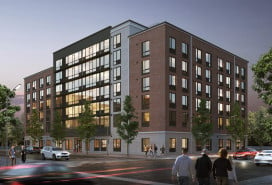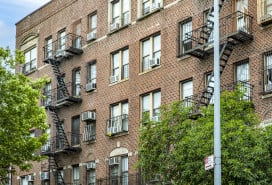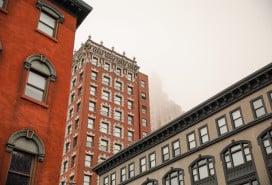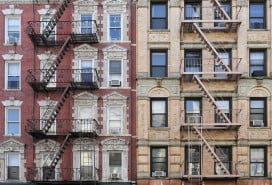Auction-stalker Malcolm Carter: "I can rarely think of a time when someone snagged a bargain"

Broker-blogger Malcom Carter has seen and blogged about more than his fair share of real estate auctions in New York City. He frequents (and is frequently underwhelmed by) public and private auctions in Manhattan and Brooklyn and closely follows those in Queens. He shared some insights with BrickUnderground in a recent interview.
How long have you been attending these auctions?
Since 2009, when I went to an auction of the Solaria in Riverdale. There was such interest in what I was writing, so I continued to follow them.
How do you hear about them?
I read about them in the real estate and business sections of the newspaper. Occasionally I find out about them online.
What’s the atmosphere like?
At a city administrator’s auction – where property is sold after someone has died without a will – it could not be more tedious. There is almost no excitement, although the the ones in Manhattan are in an amazing building, the Surrogate’s Court, which is impossibly ornate.
Can you get a bargain?
I can rarely think of a time when someone snagged a bargain. Recently, a woman got a property at 201 West 70th Street for the minimum bid, which was a little below market price, even though she was the only bidder.
Why are there so few bargains? How are the prices set?
The public administrator has the apartments appraised, and the standard is to set the price 25% below market value. So, if the assessment of the property is correct, then maybe a deal is possible.
What about private auctions of unsold condos in new developments?
New developments hold auctions when they have a number of unsold apartments – as few as half a dozen, maybe as many as 30 or so -- that have languished on the market. The atmosphere there depends on which commercial-auction company is running it. One company that I don’t respect very much had assistants roaming the large hotel meeting room where the auction was being held. An air of hysteria is what they sought to create and did. Once, one of these assistants looked right at me and said someone had met the bid, meaning me. But, of course, I knew I hadn’t made a bid. These false reports are shouted into the air to create a sense of urgency. They don’t need straw bidders; they just make bids up.
Are they all like that?
Other commercial-auction companies run auctions in a much more moderate manner. It gives people a chance to think, however quickly, in a more measured way. But still, everyone expects to get a bargain and most walk away disappointed. The ordinary consumer is at a disadvantage. Professional investors also attend, and they know the market very well. Once prices come within 25% of the actual market value, they drop out. The best recommendation I can make is caveat emptor.
What’s the advantage for the developer?
Auctioneers maintain that their sales are the best way to establish market value, because the market is there, in the room. The last person standing establishes the price, but that doesn’t take into account auction fever. Also, the entire potential market is not there…the marketing done for an auction can’t be expected to reach as many people as a conventional marketing campaign for real estate. It’s a challenge to get people to attend.
What about auction fever? Does that really drive the price up?
People may be bidding against each other calmly and knowledgeably. Or they can get caught up in the moment. One man I talked to at an auction told me he’d caught auction fever and paid more than he wanted to. People can get caught up in the emotion of it and the bid inches up without them fully realizing it. They always think their last bid will be the winning bid. The key is to prepare well and learn the market before you make an offer. Be clear about what compromises you’re willing to make because every buyer has to make compromises. And don’t fail to inspect the property you hope to win.
Is there a disadvantage for developers?
When developers hire an auction house, it costs a lot of money, and auction houses really wrestle with developers to get them to agree to lower their prices drastically. I believe that if developers skipped the auctions and just reduce the prices, they’d sell those properties without taking on those fees. They’d create bidding wars, and that’s all auctions are anyway.
What about for buyers?
There are buyer premiums at a commercially-run auction which can be as much as 10%. A buyer’s premium is kind of like a real estate broker’s fee. It’s costlier than it seems to buy at these kinds of auction. There’s no fee at a public auction.
Related posts:
The Haggle: In the bidding for a SoHo studio, he who brings an architect loses
Yes, BrickUnderground's agent referral service is free
BrickUnderground releases 3 new guides: How to Buy, Rent and Sell in NYC
























